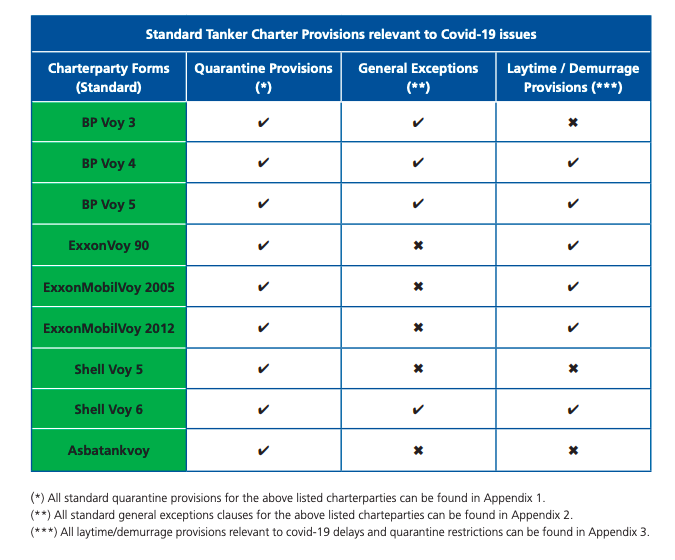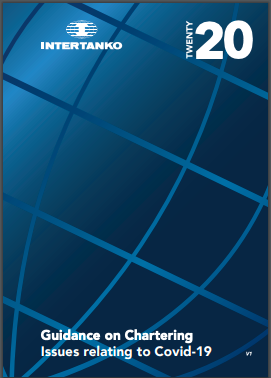A new situation has emerged with the COVID-19 pandemic, resulting to uncertainty on trade among others. In this context, INTERTANKO issued a guide to address charterparties on any questions that may arise.
Any contractual restrictions on trading to a Covid-19-affected area should be carefully assessed so as not to unduly restrict vessel trading limits and hamper commercial viability. It is also essential that both ship and shore side put in place practical and effective measures to avoid the risk of infection to crew members, which may in turn interfere with owners’ performance obligations, and vice versa to shore personnel, if any contamination is on board.
For charterparties, the key questions are:
1. Can an owner refuse to proceed to a port where there has been an outbreak of Covid-19? (Safety, force majeure, frustration)
2. Who will be responsible for disruption or delay to the fixture – e.g. losses and costs that arise from Covid-19 including e.g. quarantine, deviation, and crew illness?
3. How can the risks associated with Covid-19 be allocated in a charterparty
INTERTANKO mentions that safety, force majeure and frustration are the key consideration to be. taken into account in case a vessel refuse to proceed to a port where there has been an outbreak of Covid-19. Namely, Charterers must issue fresh orders if the port becomes unsafe prior to the vessel’s arrival. In some cases, a safe port warranty will also be implied. If the port is unsafe, owners may refuse an order to call there.
Safety relates not just to the risk of damage to the vessel or cargo due the physical characteristics of the port, but extends to other risks, including risk to the crew through the threat of infectious disease. Whether or not a port is safe will need to be considered on the facts on a case-by-case basis.
As things currently stand, it is unlikely that a port will be rendered unsafe due to the presence of Covid-19 as the risk of infection appears to be manageable if protective measures are followed, the Association explains.
What’s more, risk of detention may also render a port unsafe. This includes cases where the vessel could be blacklisted, detained or impounded at a subsequent port. In broad terms, this is detention due to political risk. So it is unlikely it will apply to concerns about Covid-19 where vessels only face quarantine delays at a subsequent port following a call in certain affected areas (similar to the isolation provisions that currently apply to many individuals returning to their home countries from affected areas)
The report aims to answer to all questions rise and examines all scenarios. With regards what a safe ports meas, INTERTANKO states that most ports are generally ‘safe’ from a chartering perspective as practical precautions are available. So owners will be bound by charterers’ orders unless the situation in the load or discharge port the vessel is ordered to changes dramatically. This may change if the number of infections continues to escalate, to a point where a port could be considered unsafe and an order to go there refused.
However, an owner should not be too quick to refuse an order due to the risk of Covid-19 without due diligence requiring investigation of the facts in each case. Refusal of a legitimate order from charterers may put owners in repudiatory breach of the charter and there can be knockon consequences under the bill of lading for any cargo on board.
Referring to charterparty provisions, INTERTANKO notes that delays in port to vessels that arrive in, or have arrived from Covid-19 infected areas, may lead to issues arising with regards to granting of free pratique, tender of a valid Notice of Readiness and commencement of laytime/demurrage.
Delays can also be encountered on the front end of a voyage when a vessel calls at a load port where the local authorities have implemented protective measures that indirectly cause port congestion or longer periods of loading and/or discharge.
In general, most standard charterparty forms include clauses that clarify responsibility between owners and charterers with regards to time in the context of laytime and demurrage, when under quarantine, where there are delays in obtaining free pratique, or for any other reason that may be unconnected to Covid-19 issues e.g. congestion, bad weather etc.
The following table identifies whether any standard provisions on quarantine, general exceptions and specific laytime and demurrage provisions incorporated in the main standard form tanker voyage charters may be applied to Covid-19-related issues.

Overall, INTERTANKO advises that Members faced with the possibility of a cancelled inspections should have contingency plans in place.
• Remind charterers that inspection reports are maintained on the OCIMF systems for periods of 12 months or longer from the date of receipt and remain valid. Time restrictions on their validity are the choice of individual charterers.
• Keep detailed records of all refusals/cancellations of inspections and any problems related to travel for seafarers, superintendents, inspectors and repair technicians.
• Request all stakeholders adopt a pragmatic approach and inform OCIMF and INTERTANKO about the issues.
Explore more by reading INTERTANKO’s guidance herebelow































































